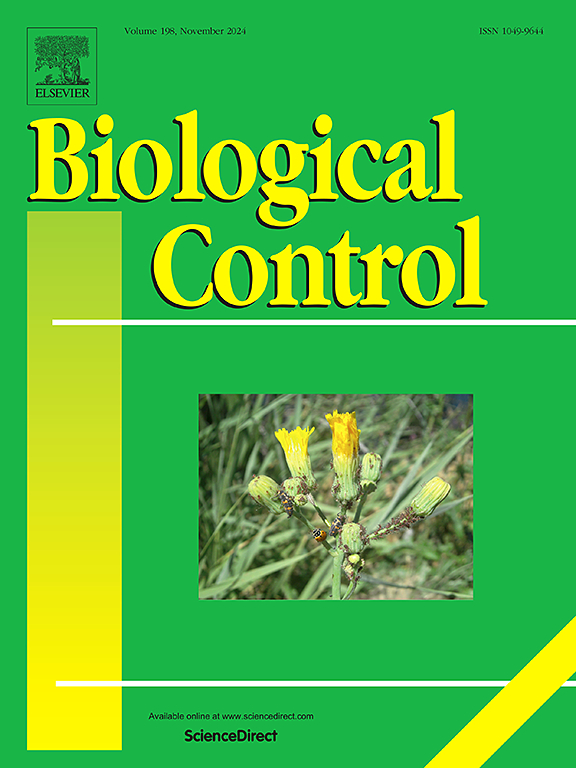新西兰奥塔哥和南兰草丛中引入的小栉孔虫(膜翅目:腕足动物)对当地象鼻虫的非目标寄生作用
IF 3.7
2区 农林科学
Q2 BIOTECHNOLOGY & APPLIED MICROBIOLOGY
引用次数: 0
摘要
寄生虫 Microctonus aethiopoides Loan(摩洛哥和爱尔兰生态型)和 M. hyperodae Loan(膜翅目:蝙蝠科)已被引入新西兰,作为农业害虫象鼻虫 Sitona discoideus Gyllenhal、S. obsoletus Gmelin 和 Listronotus bonariensis (Kuschel) 的生物控制剂。这些寄生虫也存在于本地草丛草地栖息地中,一项在九个草丛草地地点进行的为期两年的调查表明,这些栖息地中有多个地方性象鼻虫物种被这些生物控制剂寄生。在 Chalepistes、Nicaeana 和 Eugnomus 等特有物种中发现了非目标寄生的新记录。研究发现,M. aethiopoides已在这些环境中的象鼻虫群落中建立并循环,部分利用当地的象鼻虫宿主,但也存在通过三种有害象鼻虫物种从农业环境中溢出的途径。在这些环境中,地方性象鼻虫的寄生并不普遍,寄生水平大多低于 10%。本文章由计算机程序翻译,如有差异,请以英文原文为准。
Non-target parasitism of endemic weevils by introduced Microctonus (Hymenoptera: Braconidae) species in tussock grasslands of Otago and Southland, New Zealand
The parasitoids Microctonus aethiopoides Loan (Moroccan and Irish ecotypes) and M. hyperodae Loan (Hymenoptera: Braconidae) have been introduced to New Zealand as biological control agents for agricultural pest weevils Sitona discoideus Gyllenhal, S. obsoletus Gmelin and Listronotus bonariensis (Kuschel). These parasitoids are also present in native tussock grassland habitats and a survey carried out over two years at nine tussock grassland sites demonstrated that several endemic weevil species were parasitized by these biological control agents within these habitats. New records of non-target parasitism were found for the endemic species of Chalepistes, Nicaeana, and Eugnomus. It was found that M. aethiopoides is established and cycling within weevil communities in these environments, using endemic weevil hosts in part, but pathways also exist via three pest weevil species for spillover from agricultural environments. Parasitism of endemic weevils was not found to be ubiquitous in these environments and parasitism levels were mostly below 10%.
求助全文
通过发布文献求助,成功后即可免费获取论文全文。
去求助
来源期刊

Biological Control
生物-昆虫学
CiteScore
7.40
自引率
7.10%
发文量
220
审稿时长
63 days
期刊介绍:
Biological control is an environmentally sound and effective means of reducing or mitigating pests and pest effects through the use of natural enemies. The aim of Biological Control is to promote this science and technology through publication of original research articles and reviews of research and theory. The journal devotes a section to reports on biotechnologies dealing with the elucidation and use of genes or gene products for the enhancement of biological control agents.
The journal encompasses biological control of viral, microbial, nematode, insect, mite, weed, and vertebrate pests in agriculture, aquatic, forest, natural resource, stored product, and urban environments. Biological control of arthropod pests of human and domestic animals is also included. Ecological, molecular, and biotechnological approaches to the understanding of biological control are welcome.
 求助内容:
求助内容: 应助结果提醒方式:
应助结果提醒方式:


